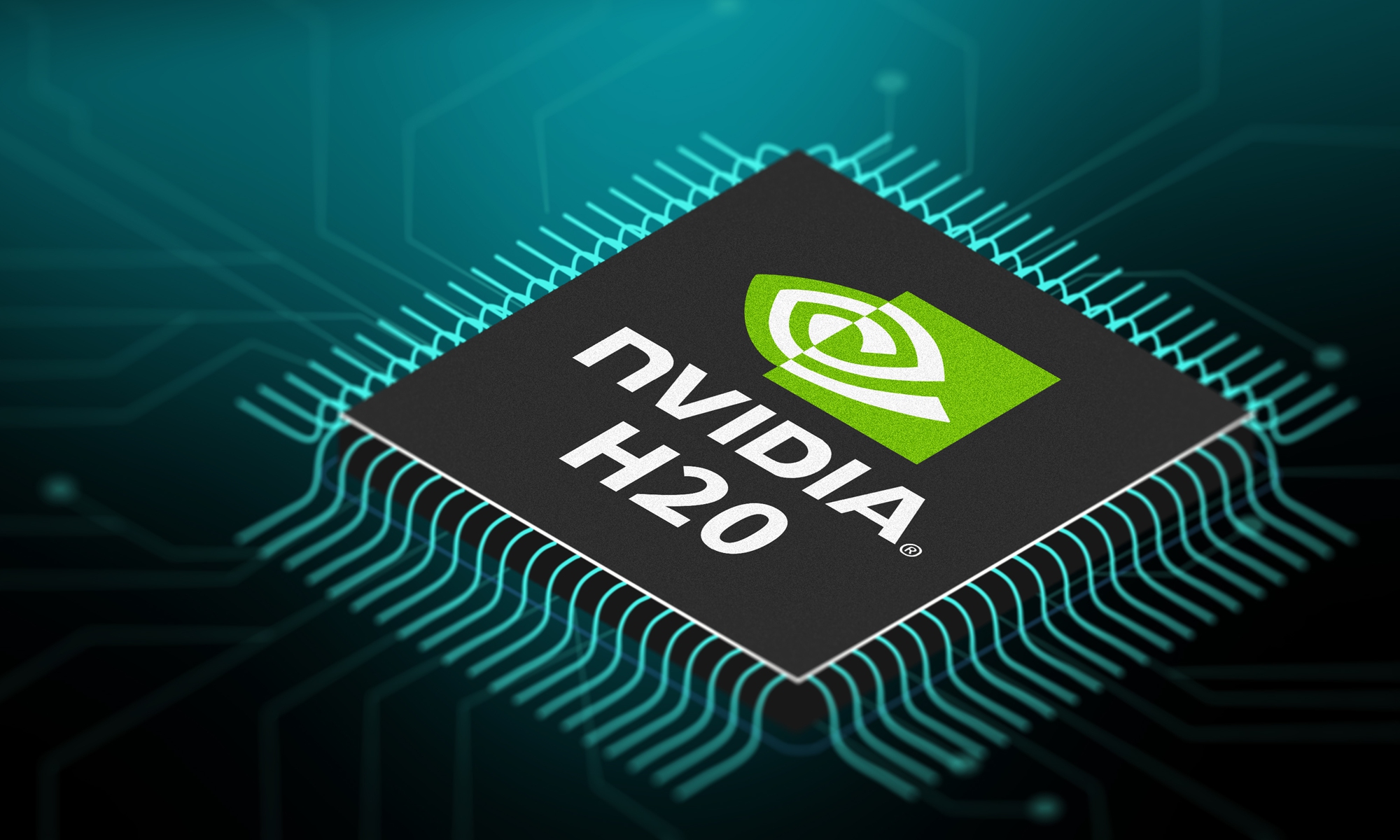Nvidia H20 chip Photo: VCG
A White House advisor claimed the Trump administration approved Nvidia’s H20 chip exports to China to prevent Beijing from gaining an edge in the race to make the best chips, Reuters reported on Wednesday. The advisor also admitted that “if China’s not buying chips from us, then they’re innovating, making their own chips.” Chinese experts called the logic self-contradictory and reflective of a hegemonic mindset, stressing that China’s chip progress will not be slowed by external factors and that technological advancement should be driven by cooperation and fair competition.
White House National economic adviser Kevin Hassett, in an apparent reference to Nvidia’s H20 AI chip shipments to China, alleged during an interview that the Trump administration “decided to let the chips go in a bid to stop China from getting ahead in the race to make the best chips,” Reuters reported.
As Reuters reported, Hassett said, “One of the risks that you have to take seriously is that if China’s not buying chips from us, then they’re innovating, making their own chips. And the one thing we don’t want is for them to jump ahead in the race for chips.”
Ma Jihua, a veteran telecom industry observer, told the Global Times on Wednesday that recent remarks by a senior US official — claiming the export of Nvidia’s H20 chip to China aims to prevent China from advancing in high-end chip development — reflect Washington’s deeply entrenched hegemonic mindset in the AI sector.
“Even though the US has approved the export of the H20 chip, it is not a shift toward cooperation but rather a continuation of containment,” Ma said. He pointed out that Washington’s narrative is internally contradictory: while allowing limited chip sales to China, it still seeks to suppress China’s technological rise, and often sends conflicting messages depending on the domestic political context.
“The US is trying to justify its policy reversal by claiming the move is still part of its effort to curb China’s chip development,” Ma noted. “It’s essentially offering a talking point to address political pressure from domestic hardline voices on China.
Zhou Mi, a senior research fellow at the Chinese Academy of International Trade and Economic Cooperation, told the Global Times that while a performance gap between Chinese and US chips remains, the US has been actively restricting China’s access to high-end semiconductors through various means. Nvidia’s H20, for example, is notably less powerful than chips available to other markets, and such restrictions have clearly harmed the company’s competitiveness in the Chinese market.
At the same time, these curbs have fueled momentum for China’s domestic semiconductor industry to accelerate development, Zhou noted.
He Weiwen, a senior fellow at the Center for China and Globalization, told the Global Times on Wednesday that the Nvidia H20 chip approved for export to China is a downgraded version designed to fall below US export control thresholds. The reason for the move, he said, is that China now has viable alternatives.
“If Nvidia cannot sell in China, it risks losing a market that accounts for roughly one-fourth of its global data center revenue,” He noted.
He pointed out that the US has long restricted high-tech exports in a bid to maintain its hegemonic position. However, Washington has failed to consider that the very foundation of its global tech leadership — particularly in the information and communications sector — has been access to global markets.
“Without access to vast overseas markets, these leading firms wouldn’t have the revenue needed to sustain large-scale R&D investment — and without that investment, technological leadership would not be possible,” He said. “The long-term consequence of US tech restrictions may be that China eventually overtakes the US in this field.”
Ma stressed that whether or not Nvidia chips are sold to China will not alter the trajectory of China’s chip development. “Chinese companies won’t halt R&D just because of one product,” he said. “In the face of global market forces and industrial trends, the US cannot stop China’s chip progress — nor can it reverse the globalized nature of the semiconductor supply chain. China’s own technological advancement will not slow down due to external factors.”
Nvidia CEO Jensen Huang said the US government has granted export permits of its H20 chips to China, China’s state broadcaster CCTV reported. The company will begin the shipment soon, Huang said on July 15.
Nvidia’s H20 chip was designed specifically for the Chinese market to comply with US export controls, but its performance falls well short of the company’s flagship H100 GPU sold globally. In April, the US banned sales of the H20 to China and other countries citing national security concerns. The ban left Nvidia with $4.5 billion in unsold inventory, forced a $5.5 billion write-down, according to multiple media reports.
China has previously issued official responses to such matters. In response to a question about Nvidia founder and CEO Jensen Huang’s announcement that the US government has approved Nvidia’s export license and Nvidia will start selling H20 chips to the Chinese market, Chinese Foreign Ministry spokesperson Lin Jian said on July 15 that “we generally do not make specific comments on the behavior of companies.”
China’s position of opposing the politicization, instrumentalization, and weaponization of science and technology and economic and trade issues and malicious blockade and suppression of China is consistent and clear, Lin said, noting that such practices disrupt the stability of the global industrial chain and are not in the interests of any party.
Global Times


